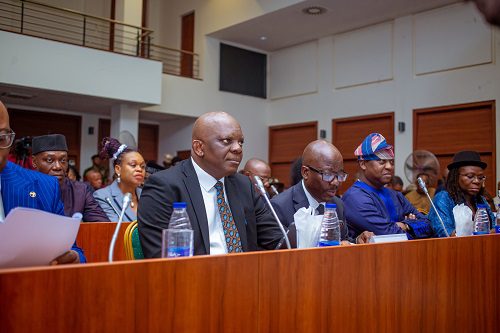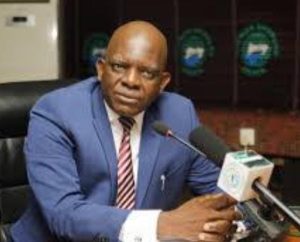NSC: Driving Ports Economic Regulation with New Powers

Barr Pius Akutah, ES, NSC, directors of the Council, among others at the National Assembly Public Hearing on NSC New Act few months ago..


For the Nigerian Shippers’ Council (NSC), the task of ports economic regulation is no doubt enormous. At a period of hard economic times, regulation of any sector is herculean as different players struggle in various ways, scrupulously and unscrupulously, to survive. The worst is now with dwindling cargo throughput at the ports, notwithstanding the huge increase in revenue being declared by the Nigeria Customs Service (NCS) which may be attributed to the exchange rate factor against our depreciated local currency value. The nation’s maritime sector is traditionally known for trade crimes coming from both sides – the providers and consumers of shipping services. Both have their inadequacies in the ports. Trade malpractices in a bid to cheat abound. Terminal operators as custodians of cargoes, multi-national shipping agencies, freight forwarders and indeed the shippers (importers and exporters) are known to be involved in corrupt practices that rob the government and the economy of hundreds of billions of Naira annually. Worse still is that in some cases, the country is profiled by the international shipping community, particularly the conference liners who provide cargo affreightment services, and others as the most expensive place to do business. And this is not unrelated to the corrupt practices and delays they experience on arriving the ports. They are also known to suffer extortion from security personnel posted to the ports. Importers and exporters also complain of extortion from the same personnel of government agencies posted to the ports. Expectedly, importers do not disclose their own inadequacies of trying to shortchange the government through under-valuation, under-declaration and outright concealment of goods for which the personnel of the government take advantage to line their pockets. That is the scenario at the seaports and airports too.
Creating Sanity at Ports
As the umpire of the system, the NSC is saddled with the statutory obligations of enthroning an efficient ports system. To succeed in this role, the regulator must have enough powers. This no doubt explains the reason why the leadership, management team of the NSC as well as other concerned stakeholders are seeking the amendment of the Nigerian Shippers’ Council Act to give the agency commercial regulatory powers. The new power is expected to give the Council a very strong footing to be able to deal with a lot of issues in the sector. To industry stakeholders, this is coming at the right time, considering the sad experience the Council has had over the years. The Council is currently in court with some shipping service providers who had questioned its powers to regulate them. This was when the service providers about 10 years ago dragged the Council to court for suspending some charges they had introduced which the regulator described as illegal. The Council won the case in both High and Appeal courts. But the case has been in the Supreme Court for long now with indications that there is an out of court settlement proposed by the shipping service providers. Despite this victory, the Council has not had it easy with the shipping service providers who still introduce shipping charges. There has also been the issue of container deposits paid by customs agents on behalf of importers. Many shipping companies find it difficult to refund the deposits after the empty containers are returned. It is believed that the only way out in all these issues and others is to empower the Council with the new law.
What the New NSC Act Stands For
At the public hearing held in June this year, the Speaker of the House of Representatives, Hon. Abbas Tajudeen, explained that the Bill for the amendment of the NSC Act seeks re-enact the Shippers’ Council and Economic Regulatory Bill to enhance “economic growth, development, diversification as well as to strengthen the Ministry of Marine and Blue Economy. The new NSC Act will ”establish an economic regulatory framework for effective and efficient regulation of commercial and related activities in the shipping and port sectors”. The Bill will also among others, create an enabling environment for private sector participation in the provision and operation of regulated services.
Abbass said of the Bill, “The amended bill encompasses critical provisions addressing several key areas essential for the effective functioning of the Nigerian Shippers’ Council.
“It details the structure and responsibilities of the management and staff, establishing a clear governance framework that defines roles and qualifications to ensure competent oversight.
“The bill lays out financial provisions, specifying guidelines for the allocation, management, and auditing of funds, which is crucial for maintaining financial integrity and providing the Council with the necessary resources to perform its duties.
“The bill also addresses offences and penalties, outlining specific non-compliance issues and their corresponding penalties”.
The Minister of Blue Economy, Gboyega Oyetola who favours the new Act said it would be for the interest of the national economy.
Represented at the Public Hearing by the Permanent Secretary, Olorunola Olufemi, the Minister said, “The ministry is willing to partner with all stakeholders in the sector, especially the National Assembly, to enthrone regulatory framework for the Marine and Blue Economy industry
“It is on this note that we are eager and very happy to be a part of the process that would reform the sector.”
Incidentally, the Chairman of the Shipping Line Association of Nigeria (SAL), Boma Alabi (SAN) also favours the new Bill, saying it will improve efficiency in the ports, lower cost and address some bottlenecks in the ports.
Alabi said, “We must be more efficient, and we welcome this regulatory agency that will be created to make things more efficient.
“We have expressed our concern internally and externally, and this committee, which has been involved in this process, must work on some areas of concern.
“There are aspects that should be expunged, like sections 40, 42, 52, and a few others; we understand the reason behind this.
“We need to put in some checks and balances so that those in the saddle will not abuse it.”
Others who have come out to support the passage of the Bill include the Coalition of Civil Society Groups in Nigeria for the Promotion of Accountability and Transparency in Governance,
According to the spokesman of the group, Nwogu Ndubisi, the Bill is a welcome development as it in addition to promoting economic growth also aims to effectively regulate the shipping industry and protect the interests of shippers. Ndubisi said it will while strengthening the Shippers Council’s regulatory powers enthrone “transparency, accountability, and efficiency to the sector. He added that it will equally reduce costs, increase competition, and improve service delivery”.
Ndubisi added, “Our coalition is pleased to note that 99 per cent of the opinions expressed at the public hearing were in favour of the Bill as presented.
“We also note that a few amendments were suggested, which the House Committee on Shipping Services, ably led by Abdulsamad Dansuki, has promised to take notice of. Such an accommodating disposition is what the electorate expects of our lawmakers, and we look forward to the House sustaining this trend.
“We want to specifically commend the Speaker of the House of Representatives of the Federal Republic of Nigeria, Tajudeen Abbas for the speedy consideration of the bill by the People’s House under his leadership.
“We plead with Senate President, Godswill Akpabio that Nigerians are eager to see the Senate replicate the pace the House has adopted in treating the bill.
“We are of the view that such accelerated handling of the Shipping Council Regulatory Bill aligns with the Senate President’s commitment to tackle inflation, economic hardship, and difficulties that Nigerians are facing. We look forward to commending the Senate for the manner it will treat the bill when it comes to the Red Chamber for concurrence.
“Our final appeal goes to the President and Commander-in-Chief of the Federal Republic of Nigeria, Bola Ahmed Tinubu, for his speedy assent when the bill is transmitted to the Presidency. With the passion he has shown for rebooting Nigeria’s economy to its optimum, we do not doubt that Mr President will treat the Shipping Council Regulatory Bill with the same urgency with which the Students Loan Bill was treated to become an Act.
“We also laud the Honourable Minister of Marine and Blue Economy, Adegboyega Oyetola for getting it right with the Shipping Council Regulatory Bill. The support he has mobilised so far shows his level of transparency and zeal to regulate the maritime economy.”
Excited about the new Bill, the Executive Secretary/Chief Executive Officer of the NSC, Barr Pius Ukeyima assured that the concerns raised by some stakeholders during the Public Hearing would be considered.
He said, “On some concerns raised by some stakeholders, some of them are germane and would be looked at going forward.
“We are not bringing in a law that would strangulate the sector. The intention is to bring sanity to the sector and to ensure that the sector is booming,”

Why We Want NSC Act Amended, by Akutah
Before the Public Hearing, the Executive Secretary, Akutah had earlier disclosed the reason why the ports economic regulator is seeking the amendment of its 2004 Act, explaining that it was to be more equipped to improve on ports efficiency. Akutah assured that the Bill will not torment stakeholders but will rather improve on ways of doing business at the nation’s ports. He pointed out that the amendment will further give the NSC a better enabling environment under which it can perform its statutory obligations within the ambit of the law.
According to him, the new Act will strengthen the incorporation of the regulations of the NSC as economic regulator, adding that the new Act will include other enablers that the Council has been looking for as ports economic regulator.
Akutah explained that under the present Act which provides for two percent port development levy as funding was inadequate considering the enormous statutory obligations of the Council.
He said, “With the amendment, the regulatory job of the agency will improve. Otherwise at the moment what we take as 2% port development levy is not adequate. It is not enough to achieve the mandate for which we are set to do”.
“ This Act will help us not only to fully establish statutorily that we are the port economic regulator/trade facilitator, but it will give us enabling environment within which to work within the ambit of the law. That Act will incorporate the regulations of the NSC as economic regulator”.
Noting that the Council has the support of the Ministry of Marine and Blue Economy and all other stakeholders in the bid to amend the old Act, Akutah said it was all for the best interest of the industry.
The Council, he said, was determined to continue to promote ports efficiency and operations around the ports .
“We want to promote at least 24 hours of cargo clearance so that gradually we can move into international standard.
“We want to also promote implementation of the electronic traffic management system in the ports which is ongoing. We see this as improving on our ports’ efficiency. Aside this, there are so many things we intend to do to ensure that our ports are placed on global standard for trade facilitation”.
 Members of the House Committee at the Public Hearing…[/caption
Members of the House Committee at the Public Hearing…[/caption
New NSC Act’s Journey So Far
The Bill was recently passed by the House of Representatives, leaving the Senate to the final task before President Ahmed Bola Tinubu is approached to sign it to law.
It was passed towards the end of July. Following this, the rest is left for the Senate where it has passed the First Reading.
Akutah recently told newsmen, “the Senate has done the first reading of the Bill, and what’s left is for them to pass the bill. But the National Assembly has gone into recess. We believe that as soon as they are back from recess, that Bill will be passed into law.
“The role that we are playing as economic regulators, once we have the law in place, which gives us the capacity to not only bark but bite, I believe that the sector will be better for it. And we are counting on all of you as well here, as the engine room of this agency.”
With the progress being made in respect of the Bill, the NSC ES has already advised the workers to prepare for more work when the Bill is finally passed.
He told the workers during the 2024 Operational Retreat organised for middle management officers of the Council.
According to him, “I want to enjoin all of you to take this training as one of the avenues that we try to build capacity for the new roles that the Council has assumed. This training is tagged training for middle management grade level 12 to 14. As middle management officers, I want you to start preparing yourselves for top management roles.
“I want you to know that in any organisation, middle management is the engine room that drives policy implementation.
“I want to bring you the greetings of the Honourable Minister of Marine and Blue Economy, who has been very supportive to us as a Council. The Minister is driving the Blue economy ministry, writing up the policy for this sector, and he is keen to see that it kicks off to achieve the desire of Mr. President that this sector contributes to the national GDP.
“The Nigerian Shippers Council, I want to let you know, is not just a factor in that regard, but is a key factor in moving the economy of this country forward through this sector that we have here.”





